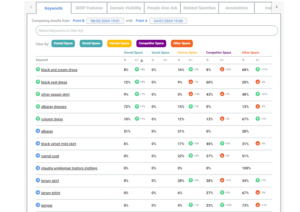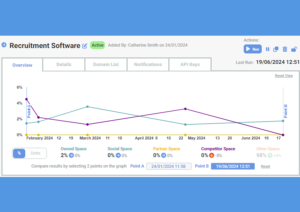Search is constantly evolving, and the main reason for that is to improve the user experience. Google, most notably, is always seeking to make things easier and better for its users, and broadly speaking that’s what drives changes in SEO.
Where once search was just a moment in time focused on a single interaction between the user and the search engine to respond to a specific query, now it’s part of an ongoing journey supporting the user’s interests, concerns and personal requirements.
This year alone has seen updates to search, particularly relating to the rollout of Google’s AI Search Generative Experience. So, what does it all mean for the future of search and consequently your business?
A brief history of search
In years gone by, the access we had to search engines with the purpose of gathering information was much more structured. Modems and dial up internet meant that the time investment to even get online to the point of searching was laborious in itself. As technology has improved, the emphasis has been on better, clearer information, delivered faster, more accurately and with the lowest level of user input.
Google has dominated the search landscape since it first appeared in 1997. Since starting out as a search engine, it has evolved from those early days of organic result listings with bright blue links, and its current user experience is unrecognisable from that of 25+ years ago.
Search in 2023: Next question please!
The ultra-customer-focused leader, Steve Jobs, once said: “Our job is to figure out what they’re going to want before they do.” Google’s attitude is similar – seeking to know what you want to search for before you know yourself.
When we talk about search we talk about push and pull advances. In traditional search the user pulls an answer from Google when they type something in. Now, Google is employing more push tactics, scaling how much people see and predicting what your next question might be before you ask it.
They are doing this in multiple and growing ways, from the Knowledge Graph to Topic Cards, and, as mentioned, with the incoming Search Generative Experience which sends related resources rather than just your standard interactions. You might notice that if you search for one thing, they will have featured results on related topics, or a video ready to play on the bit that relates to your area of interest.
Google pulls all of these predictive results from the first page of search because it’s the only place it can get that information. For businesses and organisations, that means that gaining space on the first page of search results is more important than ever, which is why a tool like SERPsketch is powerfully informative.
Search and the consumer mindset
One of the interesting things about the evolution of search is that the more informative, helpful and sophisticated it is, the more users expect it to deliver.
While some of us might remember the days where you typed in a question and got hundreds of irrelevant results, users today – many of whom don’t remember those early years – expect search to be relevant not only to their question but also to them as individuals.
If someone searches for hair styles, they expect the results to relate to hair styles that would suit their demographic, for example, and Google is delivering on that.
How Google is delivering on user search expectations
The focus of search is increasingly on being helpful, and that’s fundamentally altered how we approach SEO. The emphasis for search is evermore user centric and a key part of that is understanding the consumer mindset. Users are not simply using search to answer questions but as part of a discovery journey, so search optimisation needs to consider those query-less journeys as well as direct questions. Increasingly search is about understanding people.
What does that mean? Google is using neural matching to improve its search results. So, if you don’t know the word for what you’re searching for it will fill it in. If your TV looks funny and you search ‘why does my TV look funny?’ it knows you’re referring to the Soap Opera Effect because it’s a common problem that lots of people are searching for with HD TVs. Therefore, it knows what you’re really asking is ‘what is the Soap Opera Effect and how do I fix it?’. It then displays those results.
Another thing that’s worth considering within this evolving space is the power of brand. Some brands have become interchangeable with product names – Jacuzzi instead of hot tub, Hoover instead of vacuum cleaner, maybe even Zoom or Teams instead of ‘video call’. If Google is understanding synonyms, then could it be seeing those as ‘synonym brands’ where the brand has fallen into the keyword category, making how it’s searched, talked about and linked to a ranking factor.
Key areas of focus for improving your success on Google
Google is giving us what we want before we know it ourselves, effectively becoming a discovery engine, not least on Google Discover – its curated feed delivering articles and videos specifically on mobile devices. The principle applies across all devices however, and as a result, discovery and search need to be treated differently.
There are several elements that are supporting this evolving approach to user centricity, which we will go into below, but what this means practically is that we need to think differently about SEO and how Google’s tools support businesses in engaging with users.
For example, 34% of searches result in no click from the SERP. Often that’s not because those pages aren’t providing the required information, but because there’s an exact answer in the SERP so there’s no need for the user to click through. However, they might end up clicking through in a related search that speaks to the next stage of their discovery journey. We need to optimise for discovery instead of SEO.
Knowledge graph
The Knowledge Graph is Google’s library of facts. In effect, Google’s got two ways of storing information in search and the first is the Index, where it serves up pages – anything it believes is a fact it will put in its Knowledge Graph and this will get pulled into the SERP. Trusted businesses have a Knowledge Graph result which appears on the side of the search results with information like their Wikipedia page, company headquarters etc.
Topic cards
Topic Cards, or the Topic Layer, sits above the Knowledge Graph and on a single search you can browse multiple related topics rather than look at individual searches. If Google thinks you’re searching a topic it knows about then it serves the result as well as tabs for more information. For example, if you search dog breeds as your topic, you will also see different things come up for that breed that are typically searched for. If you search for ‘pugs’ it will also tell you about famous pugs. However, it’s granular in its approach, so it won’t give the same auxiliary information for every dog – if you search ‘yorkshire terrier’, it will come up with grooming tips because that’s typically the next question people ask about that breed.
Activity cards
Activity Cards allow you to pick up your search where you left it. If you’re mid-search but then go away and come back to it later, it will link you back in. It also asks you if you want to save things – a bit like pinning from Pinterest, as another way to help discovery.
Generative AI
This year Google’s AI-powered Search Generative Experience has progressed with its trial and roll out, the details of which are yet to fully be seen or understood. It seems that results will continue to be displayed similarly to what we know, and the purpose continues to enhance the user experience. That means having your SEO basics covered is essential – such as focusing on your schema, E-E-A-T principles, and experience authenticity. Demonstrating expertise and unique content will increase your chance of success in search. Other disruptors to search that are contributing to search updates are things like ChatGPT and its integration with Bing and Microsoft’s web browser Edge, which was announced in February 2023. It’s perhaps an indicator of where things may go in the future.
Platform diversity
It will also benefit your business to have a range of platforms in your portfolio. That’s both in terms of content types (podcasts, videos, written content), as well as using social media platforms. It is important to remember that search is just one of many digital and offline touchpoints that take place hundreds of times a day for an individual. Search now takes place in other places as well as Google – YouTube is still the second largest search engine and stats indicate that GenZ are using TikTok for the discovery of new products and experiences rather than traditional search. Those platforms are also worth considering as part of your digital marketing to support your search strategy.
Overall, Google’s focus is on continuous evolution and it’s becoming more sophisticated in that approach. What it means for you and your clients or business is that it’s important to consider the user experience as an integral part of your search strategy, answering the queries of your target market and considering their discovery journey as a whole.
The SERPsketch tool will help you understand where you sit in the SERP, and what to focus on in order to improve your user experience for online success.




